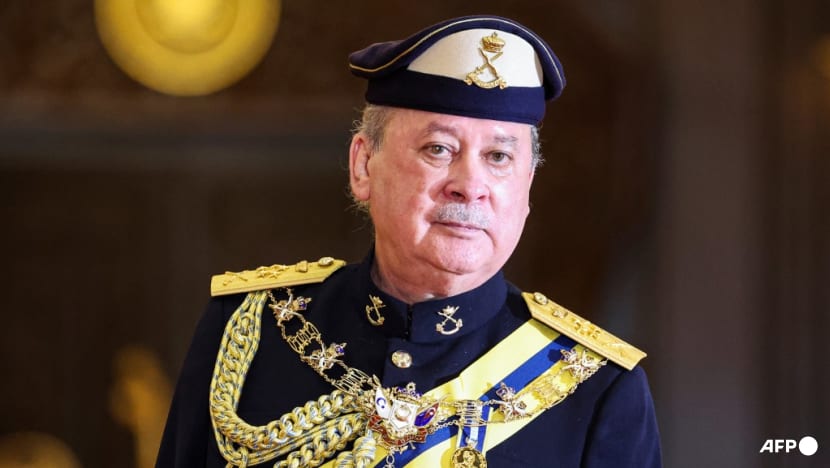Malaysian king Sultan Ibrahim to make state visit to China, eyes infrastructure support
This will be Sultan Ibrahim Sultan Iskandar's second overseas trip - after his visit to Singapore in May - since he was sworn in as Malaysia’s king in January.

King of Malaysia Sultan Ibrahim Iskandar looks on during a welcoming ceremony at the National Palace in Kuala Lumpur, on Jan 31, 2024. (Photo: AFP/Pool/Hasnoor Hussain)
SINGAPORE: Malaysian king Sultan Ibrahim Sultan Iskandar will make a four-day state visit to China this week, with the monarch likely to seek support to revive projects boosting its connectivity to neighbouring Singapore.
The trip from Sep 19 to Sep 22 is at the invitation of Chinese President Xi Jinping, China’s foreign ministry said in a statement on Wed (Sep 18). It comes as China and Malaysia mark the 50th anniversary of bilateral relations this year.
It will be the Johor ruler’s second overseas trip since being sworn in as Malaysia’s 17th king on Jan 31. His first was a two-day state visit to Singapore in early May. It will also be the first visit by a Malaysian king to China in a decade, after the country's then-monarch Sultan Abdul Halim Mu'adzam Shah travelled there in 2014.
Under Malaysia’s unique system of monarchy, the heads of the nine royal families take turns to be the king every five years, and are supposed to stay above politics.
Sultan Ibrahim will be accompanied by Transport Minister Anthony Loke, Housing and Local Government Minister Nga Kor Ming and Foreign Ministry Secretary-General Amran Mohamed Zin, Malaysia’s foreign ministry said in a statement on Wednesday, as reported by state news agency Bernama.
Senior officials from the Istana Negara and relevant ministries and agencies will also be part of the delegation.
“His Majesty will be accorded a ceremonial welcome at the Great Hall of the People in Beijing, followed by an audience with Xi. The president of China will host a state banquet in honour of His Majesty,” Malaysia’s foreign ministry said.
“His Majesty has also consented to grant an audience to (Chinese) Premier Li Qiang,” Wisma Putra added.
Premier Li visited Kuala Lumpur in June and backed Malaysian plans to develop its connectivity through the US$10 billion East Coast Rail Link to other China-backed railways projects in Laos and Thailand.
Mr Li had said that the proposal would realise plans for a proposed Pan-Asia Railway running from Kunming in China to Singapore.
"This will better promote the construction of new international land and sea trade corridors, enhance regional connectivity, and deepen the building of the ASEAN (Association of Southeast Asian Nations) community," Mr Li said at the time.
Sultan Ibrahim has spoken of plans to revive a stalled high-speed rail project between Malaysia and Singapore, with a border crossing in Forest City, a beleaguered US$100 billion China-backed development in Johor.
While in China, the monarch is also expected to attend the naming ceremony of the chair of Malay studies at Beijing Foreign Studies University in his honour. The king will also engage with the Malaysian diaspora during his visit, Wisma Putra said.
Sultan Ibrahim had said in August last year during an interview with local daily Sin Chew that it was crucial for Malaysia to maintain friendly relations with China, describing it as a “good and reliable” investment partner.
China has been Malaysia’s largest trading partner since 2009. Total bilateral trade last year was valued at US$98.9 billion, accounting for 17.1 per cent of Malaysia’s total global trade. Meanwhile, Malaysia is China’s second-largest trading partner in ASEAN, behind Vietnam.
Ties between Beijing and Putrajaya have been warming since Malaysian Prime Minister Anwar Ibrahim took office in Nov 2022.
Mr Anwar made his first visit to China as PM in late-March 2023 - attending the Boao Forum for Asia in Hainan, meeting Mr Xi and other Chinese leaders and securing a raft of investment commitments. His visit coincided with the 10th anniversary of the China-Malaysia comprehensive strategic partnership.
He followed up with another trip in September that year, participating in the 20th ASEAN-China Expo in Nanning. Mr Anwar said then that Malaysia and China had agreed to increase cooperation on projects under the Belt and Road Initiative, such as the East Coast Rail Link project.
Both countries also agreed to deepen links in areas including vocational education and training, science and technology and tourism, Bernama reported.














